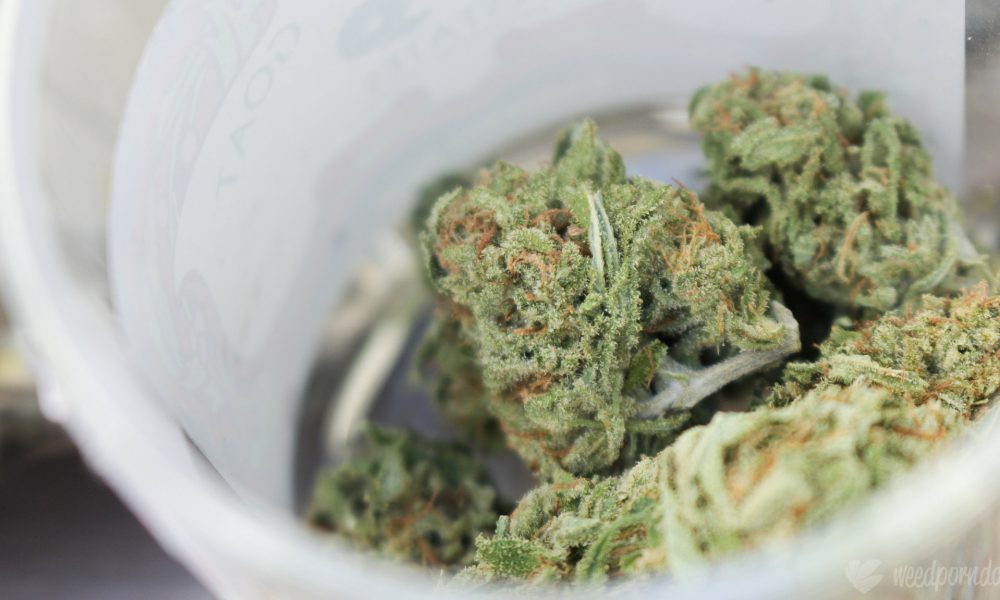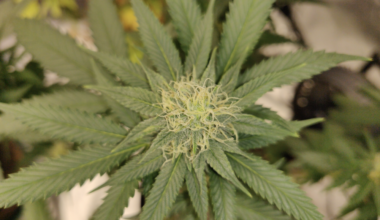“We need to fix it or all we have is a black market.”
By Ned Oliver, Virginia Mercury
Newly empowered Republicans in Virginia say plans to allow retail sales of recreational marijuana won’t necessarily be doomed under their control of the House of Delegates and Executive Mansion.
And some say they’re open to speeding up the timeline for allowing retail sales, which is currently delayed until 2024.
“You almost kind of have to,” said Del. Glenn Davis (R), calling the current state of the law, in which possession and cultivation of small amounts of marijuana is legal but buying and selling the products is not, has created a quagmire that the party can’t ignore. “I guess we’re kind of half pregnant.”
Davis’ comments echoed House Leader Todd Gilbert’s (R) statements on the subject last week, when he told reporters that GOP members in the House would have no choice but to work with Democrats in the Senate to address the half-finished legislation, which he likened to a “live grenade rolling around.”
“We need to fix it or all we have is a black market,” he said.
Republicans have made it clear, though, that one thing that’s unlikely to find favor among their members are social equity provisions, which Democrats who championed the legislation earlier this year called a driving force behind their bill but failed to finalize before the end of the legislative session.
The proposals under discussion generally aimed to set aside a class of marijuana business licenses for Black Virginians, who during prohibition were three times more likely to face arrest for simple possession than their White counterparts despite studies showing both groups used the drug at roughly the same rate. Because a law that divvied up licenses explicitly by race would likely face a challenge on constitutional grounds, Democrats were considering a criteria that opened them to people with past marijuana convictions, their family members, or graduates of a Virginia historically Black college or university.
The legislation also proposed an incubator program to help finance startups and a reinvestment fund that would send a portion of tax revenues back to neighborhoods subject to disproportionate enforcement.
During debate on the legislation last year, several Republicans said they would have been inclined to vote for legalization, but could not support a bill that prioritized people with marijuana convictions on their records for business licenses.
“I don’t know if I’d call it an equity program. I’d call it a give-a-criminal-a-company program,” said Davis, who a year earlier had voted to reduce the penalty for simple possession from a misdemeanor punishable by jail time to a $25 civil infraction. He said it would send the wrong message to kids to reward people who broke the law.
Democrats also planned to include pro-union language aimed at making it easier for marijuana industry employees to organize that drew GOP criticism.
Gilbert did not address specifics last week and his spokesman, Garren Shipley, did not return phone calls and messages seeking additional comment. But he has made clear he expects the legislation to look different next year. “I imagine the roadmap that they laid out as to how that would occur…is going to change dramatically,” Gilbert said.
It’s less certain how Republicans would handle criminal justice elements of the law. For instance, Democrats said they ran out of time to include language that would allow resentencing hearings for people currently serving jail and prison time on serious marijuana offenses.
Legalization advocates like Chelsea Higgs Wise, who founded the group Marijuana Justice, urged Democrats to shift their focus on equity from focusing on business licenses to criminal justice reforms, which she said could present an area of bi-partisan agreement. “No one should be in prison just for marijuana and I think some of our Republican lawmakers might be able to have that conversation,” she said.
Gov.-elect Glenn Youngkin (R), meanwhile, said in a tweet during the campaign that he would not seek to repeal marijuana legalization. In a statement at the time, campaign spokesman Matt Wolking added that Youngkin “suspects that revenue projections from legalization are way overstated, as they have shown to be in other states. With legalization, real emphasis must be placed on ensuring minors do not use this drug or have access to it.”
His incoming administration has so far declined to say anything else on the subject, responding with a verbatim copy of the July tweet and statement when asked Wednesday if Youngkin has any additional thoughts on the issue.
Democrats have already been debating whether to speed up the timeline for retail sales, worrying that the decision to end criminal penalties for possession without creating a legal way to buy the drug is empowering the black market.
Lawmakers set a 2024 date for retail sales because they said they wanted to give ample time to establish the new Cannabis Control Authority and write regulations that will govern the industry.
An interim option—allowing the currently existing medical dispensaries to begin retail sales as a stop-gap measure—was rejected by lawmakers who worried it would undermine the planned social equity programs by giving the medical companies an unfair head start.
It’s unlikely GOP lawmakers would share that concern given their general opposition to equity programs. And on the Democratic side, some lawmakers are holding out hope they can do both.
At a meeting of the General Assembly’s Cannabis Oversight Commission on Wednesday afternoon, a representative of Jushi, a multi-state cannabis business holds the medical license to sell the drug in Northern Virginia, told lawmakers the industry has the capacity to sell to medical and recreational customers. Discussions have included proposals that would require medical producers to serve as incubators for future social-equity licensees.
“Our view is essentially that you could start the adult use market on July 1 if it was the will of the General Assembly,” said Alexander Macaulay, a lobbyist for the company.
Virginia NORML, which has been advocating for legalization for decades, also supports allowing medical dispensaries to sell to recreational customers. The organization’s director, Jenn Michelle Pedini, said most other states that have legalized marijuana have taken a similar approach. “The question is how long do we want to maintain this in-between phase, which disadvantages consumers and encourages the illicit market,” Pedini said, saying NORML’s members are “frustrated we have operational dispensaries in the state but unless they have a medical certificate, they cannot shop there.”
Democrats, who still control the commission, are weighing the issue. But the chair of the subcommittee tasked with exploring options, Del. Don Scott (D) acknowledged he’s ultimately unlikely to have much say in the decision and began referring to the sole Republican assigned, Del. Will Morefield (R), as the future chair.
Morefield said that while House Republicans have yet to establish a policy on the issue, but said he is personally open to allowing the dispensaries to sell to recreational customers.
“Absolutely,” he said. “I think this is something we are venturing into that we’ve never ventured into before… We’ve got to fix it and we’ve got to get it right. For us just to say no, we’re not willing to work with one another to make this right would be irresponsible. It’s not the Virginia way.”
This story was first published by Virginia Mercury.
Medical Disclaimer:
The information provided in these blog posts is intended for general informational and educational purposes only. It is not a substitute for professional medical advice, diagnosis, or treatment. Always seek the advice of your physician or other qualified healthcare provider with any questions you may have regarding a medical condition. The use of any information provided in these blog posts is solely at your own risk. The authors and the website do not recommend or endorse any specific products, treatments, or procedures mentioned. Reliance on any information in these blog posts is solely at your own discretion.







